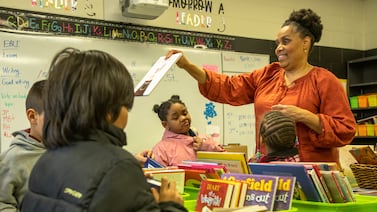Indiana’s 2023 legislative session is under way, and state legislators have introduced more than 100 new education bills and bills impacting schools and students. For the latest Indiana education news, sign up for Chalkbeat Indiana’s free newsletter here.
A bill that would expand school choice in Indiana and divert funds from public schools advanced on Wednesday with major changes.
Senate lawmakers enlarged the pool of students who could receive state money to attend private schools, but backed away from an initial proposal that would have opened the state’s Education Scholarship Accounts to all students regardless of family income or education needs.
Sen. Brian Buchanan amended his bill on Wednesday to limit the accounts to families meeting the program’s current income requirements. His changes also would reserve half of the total appropriation for students who receive special education services — the group the accounts currently serve.
The amended legislation passed the Senate Committee on Education and Career Development by a vote of 8-5, with GOP Sen. Jean Leising joining the four Democrats on the committee in opposition. It now heads to the appropriations committee.
The bill could become one of the more notable education policy legacies of Indiana’s 2023 legislative session. Proponents say it puts more control in parents’ hands over their children’s education.
“Any time you can give more choice and more options for parents, I believe it’s better,” said the bill’s author, Buchanan, in committee hearings last week.
Meanwhile, critics assail the program for siphoning off funds from state education and public schools.
“This is not about parent choice, this is about diverting and divesting money away from public schools,” said Sen. Fady Qaddoura, a Democrat.
Other concerns from opposition lawmakers included expanding a relatively new program to all families without data to gauge its effectiveness.
Created in 2021, the scholarship accounts currently are open only to students who receive special education services and whose families who don’t exceed certain limits on household income, allowing them to use state funding to attend private schools.
Buchanan’s bill would remove special education requirements, opening the choice program to families with a household income up to 300% of the federal poverty level. It would also raise the grant that a student would receive from 90% to 100% of the state tuition dollars earmarked for their public school.
The total cost of the proposal hasn’t been revealed, and that cost will determine the number of students who could participate. Buchanan said the appropriations committee would make that determination, but that he would support a $10 million appropriation, equal to its current budget.
Though just 143 students participate in the education scholarship program in 2022-23, interest is likely to increase as more people become aware of it, according to the bill’s fiscal note. Senate Bill 305 will make more families whose students attend private schools eligible for state support, potentially increasing the total cost to the state, according to the note.
The education scholarship accounts are separate from the Choice Scholarship program, which is open to most students from low- and moderate-income families in Indiana. That program served around 44,000 students last year, at a cost of about $240 million.
The expansion of the education scholarship accounts is not the only voucher or voucher-like program that lawmakers are considering this session. Another would create career scholarship accounts, giving students state grants to spend on job training with organizations outside their schools.
Career scholarship accounts would not come out of tuition support dollars for schools, though they would render schools ineligible for career and technical education dollars for each student who opts for a scholarship account instead.
Aleksandra Appleton covers Indiana education policy and writes about K-12 schools across the state. Contact her at aappleton@chalkbeat.org.







